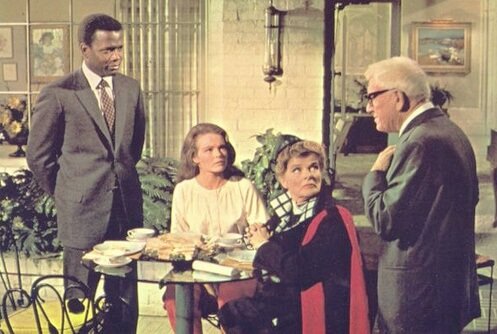When Your Family Affects Your Relationship


Written and verified by the psychologist Valeria Sabater
If your family affects your relationship, things can get very complicated. You might have to learn to deal with situations that you weren’t prepared for and didn’t ask for. Although we might not think about it this way, when you choose your partner, you’re also choosing their family.
Interfamily dynamics, conflicts, and arguments are very common. What’s more, the magazine Psychology Today published a study that revealed that three out of four couples have significant problems with their in-laws. The study also showed that an alarming 60% of women have problems with their partners’ mothers.
“Happy families are all alike. Every unhappy family is unhappy in its own way.”
-Leo Tolstoy-
In some ways, we’re reminded of that wonderful Stanley Kramer movie, Guess Who’s Coming to Dinner. In this film, a young woman decides to get engaged to a black man and brings him home to meet her parents. How her parents take the situation is a good summary of what these kinds of conflict are often about. Parents often think they’ve educated their children well and instilled certain values in them but, at the end of the day, they choose partners that don’t necessarily fit the family’s expectations.
Parents often consider their children free people capable of making their own choices. They see them instead as personal projects onto whom they can project their own set of ideals. So, when they start a relationship with someone, parents are often disappointed.
When your family affects your relationship, it’s important to talk about it. Otherwise, the very foundations of the relationship will be on unstable ground.

Between a rock and a hard place: When your family rejects your partner
There are many different types of families. As Oscar Wilde said, nothing is more sealed and mysterious than the home, where you can close the curtains and no one knows what goes on there. Of course, some parents are emotionally stable and understand boundaries. They’re perfectly capable of having a respectful and healthy relationship with their children’s significant others.
However, sometimes the opposite is true. Sometimes the family dynamic is toxic, controlling, and even authoritarian. It’s easy to start a relationship with someone and be completely ignorant of their toxic family dynamic. The classic example is problems with the in-laws, but people often forget about other issues. There might be sibling rivalries, difficult cousins, critical aunts and uncles, grandparents who stick their noses in everything, etc.
A family can be like its own tiny universe with its own laws and dynamics. You might have a conflict with older relatives trying to assert their authority or with passive-aggressive mothers. Child-rearing disagreements are a very common, along with arguments about religion and politics. You might feel that the family doesn’t approve of you and that you aren’t good enough. When something like that arises and starts to affect you, it throws everything off balance. When the family crosses the line, you have to find a way to re-direct the situation without causing any harm. That can be very tricky.

What to do when your family affects your relationship
Some people choose the most extreme route. For example, making their partner choose between them and their family. Some families end up taking sides. Others choose silence and just let things happen. They sometimes end up being the scapegoat that puts up with everything out of love for their partner. Whatever the path, sooner or later they all lead to some kind of conflict.
As tempting as it is to want to completely shut your partner’s family out, that doesn’t usually solve the problem. The good news is that there are better options. Here are some strategies that might help:
- Maintain constant communication with your significant other. You have to let them know how you feel about what’s happening. Avoid criticism. Just try to express the truth about what’s happening without disparaging or offending anyone.
- Every family is different. It’s important to differentiate between what’s acceptable and what isn’t. There’s a difference between being understanding and letting yourself be mistreated.
- Make an agreement with your significant other about your limits. You both should have a clear idea of what you’re okay with and where you draw the line. Even if you and your partner agree on everything, you have to lay down the rules about the family so that everyone is on the same page.
- You should also let your family know what about their behavior is hurtful or annoying. The critical mother-in-law, the intolerant brother, the controlling father… Practice assertiveness and communicate your discomfort so that they understand the impact of their behavior. Talk about alternatives that could help improve the quality of the relationship.

Dealing with the issue can strengthen your relationship
In conclusion, although sometimes family affects your relationship, that isn’t always a bad thing. Sometimes your in-laws can be wonderful, welcoming, and even be there for you in moments of crisis. If they have a bad influence on your relationship, however, you have to talk with your partner about how to deal with that. That way, you’ll both be on the same page, and your partner will support you when difficult situations arise. If you deal with family issues in a mature and timely manner, your relationship will be better off in the long run.
When your family affects your relationship, the most important thing is to come to an agreement with your significant other about what actions to take.
If your family affects your relationship, things can get very complicated. You might have to learn to deal with situations that you weren’t prepared for and didn’t ask for. Although we might not think about it this way, when you choose your partner, you’re also choosing their family.
Interfamily dynamics, conflicts, and arguments are very common. What’s more, the magazine Psychology Today published a study that revealed that three out of four couples have significant problems with their in-laws. The study also showed that an alarming 60% of women have problems with their partners’ mothers.
“Happy families are all alike. Every unhappy family is unhappy in its own way.”
-Leo Tolstoy-
In some ways, we’re reminded of that wonderful Stanley Kramer movie, Guess Who’s Coming to Dinner. In this film, a young woman decides to get engaged to a black man and brings him home to meet her parents. How her parents take the situation is a good summary of what these kinds of conflict are often about. Parents often think they’ve educated their children well and instilled certain values in them but, at the end of the day, they choose partners that don’t necessarily fit the family’s expectations.
Parents often consider their children free people capable of making their own choices. They see them instead as personal projects onto whom they can project their own set of ideals. So, when they start a relationship with someone, parents are often disappointed.
When your family affects your relationship, it’s important to talk about it. Otherwise, the very foundations of the relationship will be on unstable ground.

Between a rock and a hard place: When your family rejects your partner
There are many different types of families. As Oscar Wilde said, nothing is more sealed and mysterious than the home, where you can close the curtains and no one knows what goes on there. Of course, some parents are emotionally stable and understand boundaries. They’re perfectly capable of having a respectful and healthy relationship with their children’s significant others.
However, sometimes the opposite is true. Sometimes the family dynamic is toxic, controlling, and even authoritarian. It’s easy to start a relationship with someone and be completely ignorant of their toxic family dynamic. The classic example is problems with the in-laws, but people often forget about other issues. There might be sibling rivalries, difficult cousins, critical aunts and uncles, grandparents who stick their noses in everything, etc.
A family can be like its own tiny universe with its own laws and dynamics. You might have a conflict with older relatives trying to assert their authority or with passive-aggressive mothers. Child-rearing disagreements are a very common, along with arguments about religion and politics. You might feel that the family doesn’t approve of you and that you aren’t good enough. When something like that arises and starts to affect you, it throws everything off balance. When the family crosses the line, you have to find a way to re-direct the situation without causing any harm. That can be very tricky.

What to do when your family affects your relationship
Some people choose the most extreme route. For example, making their partner choose between them and their family. Some families end up taking sides. Others choose silence and just let things happen. They sometimes end up being the scapegoat that puts up with everything out of love for their partner. Whatever the path, sooner or later they all lead to some kind of conflict.
As tempting as it is to want to completely shut your partner’s family out, that doesn’t usually solve the problem. The good news is that there are better options. Here are some strategies that might help:
- Maintain constant communication with your significant other. You have to let them know how you feel about what’s happening. Avoid criticism. Just try to express the truth about what’s happening without disparaging or offending anyone.
- Every family is different. It’s important to differentiate between what’s acceptable and what isn’t. There’s a difference between being understanding and letting yourself be mistreated.
- Make an agreement with your significant other about your limits. You both should have a clear idea of what you’re okay with and where you draw the line. Even if you and your partner agree on everything, you have to lay down the rules about the family so that everyone is on the same page.
- You should also let your family know what about their behavior is hurtful or annoying. The critical mother-in-law, the intolerant brother, the controlling father… Practice assertiveness and communicate your discomfort so that they understand the impact of their behavior. Talk about alternatives that could help improve the quality of the relationship.

Dealing with the issue can strengthen your relationship
In conclusion, although sometimes family affects your relationship, that isn’t always a bad thing. Sometimes your in-laws can be wonderful, welcoming, and even be there for you in moments of crisis. If they have a bad influence on your relationship, however, you have to talk with your partner about how to deal with that. That way, you’ll both be on the same page, and your partner will support you when difficult situations arise. If you deal with family issues in a mature and timely manner, your relationship will be better off in the long run.
When your family affects your relationship, the most important thing is to come to an agreement with your significant other about what actions to take.
This text is provided for informational purposes only and does not replace consultation with a professional. If in doubt, consult your specialist.







